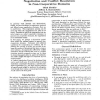Free Online Productivity Tools
i2Speak
i2Symbol
i2OCR
iTex2Img
iWeb2Print
iWeb2Shot
i2Type
iPdf2Split
iPdf2Merge
i2Bopomofo
i2Arabic
i2Style
i2Image
i2PDF
iLatex2Rtf
Sci2ools
AAAI
1990
1990
Negotiation and Conflict Resolution in Non-Cooperative Domains
In previous work [Zlotkin and Rosenschein, 1989a], we have developed a negotiation protocol and offered some negotiation strategies that are in equilibrium. This negotiation process can be used only when the "negotiation set" (NS) is not empty. Domains in which the negotiation sets are never empty are called cooperative domains; in general non-cooperative domains, the negotiation set is sometimes empty. In this paper, we present a theoretical negotiation model for rational agents in general noncooper at ive domains. Necessary and sufficient conditions for cooperation are outlined. By redefining the concept of utility, we are able to enlarge the number of situations that have a cooperative solution. An approach is offered for conflict resolution, and it is shown that even in a conflict situation, partial cooperative steps can be taken by interacting agents (that is, agents in fundamental conflict might still agree to cooperate up to a certain point). A Unified Negotiation Pro...
| Added | 06 Nov 2010 |
| Updated | 06 Nov 2010 |
| Type | Conference |
| Year | 1990 |
| Where | AAAI |
| Authors | Gilad Zlotkin, Jeffrey S. Rosenschein |
Comments (0)

